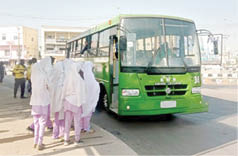The Kano State Government’s move to sanitise the transport sector in Kano metropolis on Wednesday entered a new phase with the enforcement of restrictions on commercial tricycles on major township roads and the rolling out of the Bus Mass Transit (BMT) scheme and taxis on the affected roads.
But the enforcement lasted for barely 12 hours when the state government announced that it had rescinded the ban pending when all issues surrounding its ineffective takeoff were resolved.
Daily Trust reports that the BMT scheme was first mooted when the tricycle operators went on strike in February, 2021, and the lacuna created could not be immediately filled. The need for the scheme came up again when the tricyclists went on another strike in January, this year as a result of a hike in the annual levy they pay to government. The government then promised that it would deliver on the BMT scheme to reduce traffic congestion and the monopoly of the tricyclists on commercial transportation, which it said was not befitting of a mega city.
But this phase in the development agenda of the state government has encountered teething troubles, which stem majorly from improper sensitisation of the residents and the tricyclists on the operational strategy deployed, as well as the timeframe given for the enforcement.
Rural electrification: Contractors seek partnership with FG
Army begins review of theatre operations nationwide
The state government had through the Kano Road and Traffic Agency (KAROTA) on Monday announced Wednesday, November 30, as the day for the commencement of the restrictions, and the agency kept to its words when as early as 9am it deployed its men and officials to strategic locations on the designated roads with the aim of stopping the tricyclists from plying the routes. The major township roads affected by the restriction are Ahmadu Bello Way by Mundubawa-Gezawa (Hadejia Road) and Tal’udu-Gwarzo Road.
Daily Trust reports that students, workers and businessmen and women commuting regularly on the axes had difficulties getting to their destinations as the buses were not readily available. Some tricyclists were seen daring the enforcement personnel by plying the roads while charging exorbitant fares.
Students from Race Course Model School, who wrote an examination at 9:20am were seen trekking a distance of about two kilometres to Mundubawa Roundabout while searching for vehicles that will convey them to their various destinations.
It was also observed that many people resorted to using every alternative means of transportation as they could not wait.
Daily Trust further observed that there was an influx of motorcycles conveying passengers on these major roads while many others were seen by the roadsides waiting.
Margret Johnson, a middle-aged woman, said, “Honestly, as you can see, almost everybody here is waiting either for the buses or mini-trucks to move. As for me, I am already an hour late for work. It is the government’s decision, we can’t do anything, but it is not easy,” adding that she understood that the government meant well for the state with the policy but that the timeframe was too short, noting that proper sensitisation was not carried out.
For Musa Ado, a tricyclist, it is a new dawn on his business. He said he was afraid he because he could no longer pay his weekly returns.
He said, “I don’t know what to do. I do my business on this road for more than a year now. My tricycle is worn out already; I can’t take it somewhere, so I am now pushed into the feeder routes. I don’t think I can survive it.”
Umar Usman, popularly known as Skipper, is a tricycle operator who has been in the business for about three years and he is afraid that the timeframe given for the enforcement was what heightened the anxiety among his colleagues.
Usman also said most of them did not even understand how the restriction was meant to work because what many of them thought was that the government had banned tricycle operations in the entire Kano metropolis and that when he came out on Wednesday and saw the barricades created by the KAROTA and police officers, he feared for his means of livelihood.
“Those routes are very busy and important. It will only bring suffering to people. The vehicles will not be enough. Just wait and see,” he added.
Another tricyclist, Ashiru Ibrahim, feared the policy might only increase joblessness among the youths and may eventually increase crimes in the state.
The Chairman of Kano Tricycle Operators Association (TOAN), Salisu Sa’id Dankoli, said the decision came impromptu and would definitely affect operators.
“You know, we haven’t seen anything like this before, it’s new to us and of course we will find it hard to cope with but we have accepted it as already the state governor, Abdullahi Umar Ganduje has told us that where those vehicles will follow, we are not going to use it. We are trying our best to identify with the decision and calling on our members to be law-abiding,” he added.
‘Miscreants’ vandalise 12 buses
Daily Trust gathered that protesters at the Yankaba area attacked several of the buses deployed by the Kano Metropolitan Transport Company (KMTC).
The Executive Vice Chairman of the company, Yusuf Aliyu Yakasai, confirmed that at least 12 vehicles were vandalised by the miscreants, who he believed were mobilised by those that did not have a proper understanding of the project and the overall benefit Kano tended to rip from it.
He, however, insisted that the activities of the miscreants would not deter the company.
He also confirmed that because of the incident, the company had to withdraw the buses in the morning hours to make proper arrangements for their safety and that the buses were returned to the roads in the evening.
He explained that Kano metropolitan area required between 300 and 400 buses for the BRT scheme and that the 100 buses rolled out were the first phase to cover the major roads where tricyclists had been restricted.
he explained that the buses that were bought for N2.6b would operate between 6:30am and 8:30pm and that the mode of payment would be electronic, with the company already sharing 18,000 cards that would be used for payment, and that students would be given special attention, which included the designation of some buses to school areas.
“We have been running these buses free of charge for the past few weeks and using the opportunity to also distribute the cards to the residents also free of charge. It will also interest you to know that even today (Wednesday), we did not charge any fare from those we commuted. With every new development, you expect some challenges here and there but we are up to the task, we are learning and adjusting and we are sure we will deliver a BMT scheme that Kano people will be proud of and everyone will soon buy into the idea,” he said.
He explained that the buses were in four different capacities and that with just one of them, at least 20 tricycles were taken off the road at any given time.
But the optimistic words of the KMTC boss was not convincing enough for the state government, which had already been inundated with the complaints and also the breakdown of law and order following the attack on the buses.
There are fears in government circles that opposition politicians will use the situation to create disaffection among the populace.
Thus, the Managing Director of KAROTA, Baffa Baba Dan’agundi, summoned an emergency news briefing where he announced the government’s decision to rescind its earlier directive and gave a new directive for tricyclists to return to the roads they were hitherto banned from.
Dan’agundi said findings of the government revealed that the KMTC was not ready for full deployment and that had put many commuters, including school-age children, in difficult situations.
The government, therefore, directed the company to put its house in order to ensure a smooth take-off of the project.
Meanwhile, as part of effort to tackle the teething troubles of the new scheme, the Kano State Investment and Properties Limited (KSIP), has distributed 50 cars to the tricycle riders and taxi riders associations for onward distribution to their members to be used as taxis on the affected roads.
The Managing Director of KSIP, Dr Mohammed Jibrilla, said the taxis were meant to sanitise the transport sector and reduce the traffic congestion in the metropolis, as well as alleviate the challenges to be encountered by commuters and tricyclists along the routes.
Daily Trust further reports that the Governor, Abdullahi Umar Ganduje had while commissioning the 100 buses and 50 taxis, said the vehicles were the first phase of the mass transit project aimed at addressing transportation challenges in the metropolis.
From Clement A. Oloyede & Salim U. Ibrahim (Kano)




